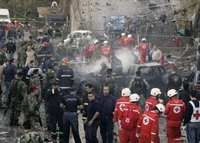Lebanon mourns for top general slain in car bombing
Lebanon bid farewell to a top general slain in a car bombing.

The assassination two days ago of Maj. Gen. Francois Hajj, the first military figure to be killed by a string of attacks since 2005, shook a Lebanese public accustomed to death but unprepared for an assault on the army - seen as the sole institution holding the country together.
Citizen's from the country's feuding factions seized on that emotion Friday, standing together in the rain to say goodbye to the military's second highest ranking officer with a shower of tears and rose petals.
Army chief Gen. Michel Suleiman - seen as the likely consensus candidate for president - bid farewell to Hajj during the funeral with a sharp salute in front of his coffin, as the military called on Lebanon's Western-backed government and pro-Syrian opposition to end their political deadlock
"In unity, we will have the strength and we can achieve the impossible," said army chief of staff, Maj. Gen. Shawki Masri, during Hajj's funeral.
Masri promised the military would "not rest until the murderers are apprehended and punished," a reassuring message to Lebanese citizens who saw Hajj's assassination as an assault on the country itself.
"They killed Hajj because he was a clean leader, a poor and wise man with foresight," said Kafa Makhlouf, a 45-year-old Christian housewife, who drove an hour to Harisa, the Christian town where the funeral service was held.
Clutching her umbrella, Makhlouf, said Hajj's assassins sought to "split the army, the only guarantee of national peace and unity."
Tony Khoury, an 18-year-old Christian student, said he believed Hajj was killed because he was simply "a patriotic man who defended Lebanon."
Hundreds of grieving Lebanese stood in the downpour as Hajj's flag-draped casket was taken from his home in the Beirut suburb of Baabda to a Maronite Catholic basilica in Harisa.
"Their bloody message will not scare us," read one banner along the route, referring to Hajj's still unknown killers. An old woman threw rose petals in front of the procession as it passed through the port city of Jounieh.
Hajj's slaying has heightened tensions at a time when Lebanon is embroiled in the latest chapter of its yearlong crisis - a dispute over electing a new president. The post has been empty since Emile Lahoud's term ended Nov. 23, with supporters of the Western-backed government and the opposition, led by the Shiite militant group Hezbollah, unable to agree on a successor.
There was no claim of responsibility for Wednesday's bombing. Military investigators are focusing on the possibility Hajj was killed by Islamic militants because he led a three-month military campaign this summer against an al-Qaida-inspired group holed up in a Palestinian refugee camp in Lebanon.
But investigators are also looking into the possibility he was killed in connection to the dispute over the presidency. Hajj was expected to succeed Suleiman at the military helm if he was elected president.
French President Nicolas Sarkozy appealed to political leaders in Lebanon on Friday to elect a president who can unite the nation, saying a parliamentary vote scheduled for Monday was "the last chance."
"France urges all parties, at home and abroad, to do all they can for Lebanon to have a president of unity and consensus," said Sarkozy following an EU summit in Brussels.
Pro-government and opposition politicians, including a delegation from Hezbollah, attended Hajj's funeral mass in Harisa. Bells tolled while army pallbearers carried the coffin and hundreds of mourners applauded.
The service was led by Cardinal Nasrallah Sfeir, head of the influential Maronite Church from which Lebanon's presidents are drawn and to which Hajj belonged.
"Today, the hand of treachery has reached the army and its brave leaders," Sfeir told mourners at the ceremony.
A message from Pope Benedict XVI condemning "unjustified violence" and calling on Lebanese politicians to reconcile was read by a bishop.
After the mass, the coffin was driven to Hajj's hometown of Rmeish near Lebanon's southern border with Israel for burial in his family's cemetery. At a stop in the port city of Sidon, Hajj's son, Elie, greeted some 1,000 people gathered there, shaking his fist determinedly in the air as tears filled his eyes.
Also Friday, Hajj's driver, Khairallah Hadwan, a Shiite who was killed alongside his boss in the bombing in Baabda, was buried in the eastern Bekaa Valley following a service filled with Islamic prayer under the yellow banner of Hezbollah.
Subscribe to Pravda.Ru Telegram channel, Facebook, RSS!





